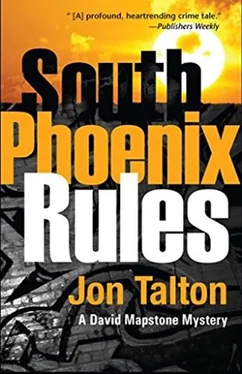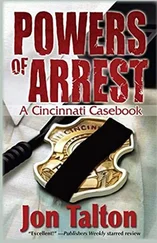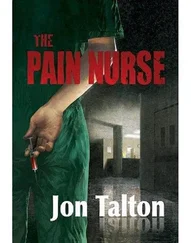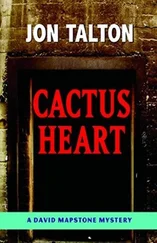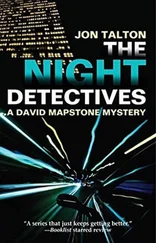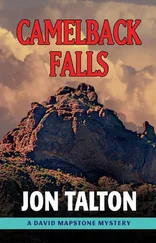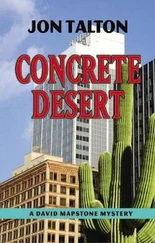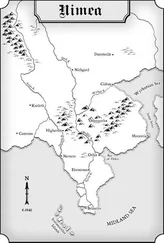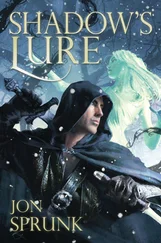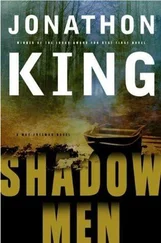“How do you like working for the new sheriff?”
“I’m not going to stay.”
I lied. I bent the truth. For the moment, there was no reason for Amy to think I didn’t still carry a badge. It was a useful fiction and I could use it for a few more days without getting caught; paperwork traveled slowly down on Jefferson Street. I had used my name and badge number that afternoon to run my scumbag through the NCIC. His wallet had two stolen credit cards and fifteen dollars cash, but his California driver’s license was true. And he was a member of La Familia-on parole after doing time for assault and weapons possession, the latest in a long and violent sheet.
“Here’s a gift for lighting your backyard grill.” I reached into my windbreaker pocket and tossed Amy the yellow book of matches. She studied it all of five seconds.
“Where did you get this, David?”
“Off a banger who was watching the house the other night. He’s La Fam. Then I took a little field trip, too. Quite an operation at Jesus Is Lord. Good ole Barney.”
“You know you shouldn’t be doing this.” Her voice assumed a taut, supervisory tone. “If you see a suspicious vehicle, call PPD. This isn’t a county case and you’re personally involved anyway. I can’t believe you did that.”
But I did, so I just smiled at her, and let the silence collect between us.
“How’s Lindsey taking all this?”
“She’s concerned. She’s in D.C.”
“Already? Well, she’ll go far. Fighting cyber attacks is the growing field and she’s got the skills.”
I didn’t go for the distraction. I just watched her and kept my mouth shut.
“Look,” she said, “you know Phoenix is the center for people smuggling into the United States. The coyotes bring them across the desert and once they’re here, they spread out all over the country. Even corporations hire the smugglers to get them to the poultry and hog operations in North Carolina or the packing plants in Nebraska. We’re number one in kidnappings and almost all of that is tied into the people smuggling. Now the probability is high that we’ve become ground zero in the drug trafficking organizations’ ongoing expansion in this country. So if La Familia has shown up, it doesn’t surprise me.”
“And they say we don’t have a diverse economy.”
She didn’t smile. “Local law enforcement is not ready for what’s coming, David. That war down in Juarez and Tijuana-it could come here. The people behind their gated communities think this won’t touch them. They’re wrong.”
“But I thought tax cuts would solve everything,” I said.
“The thing is, we don’t just import and distribute, with all the bodies along the way. We’re probably the biggest hub for firearms smuggling back the other way.”
“The drug war in Mexico.”
“Exactly,” she said. “Calderon’s offensive has set off a bloodbath down there. The cartels get their guns from here.” The Mexican president had promised an offensive against the narcos, and the border had been convulsed with violence. I wondered when we would have a failed state on our southern flank. And the firepower for the bad guys was courtesy of the good old U.S. of A.
I asked her if it was that easy.
She nodded emphatically. “The gun laws are so lax. There are six thousand licensed gun dealers in the border states and we have two hundred agents to police them. Try to get an Arizona jury to convict these gun dealers. Not going to happen.”
I listened as she explained the enterprise: American citizens can take the guns across the border-they won’t be searched going in. The smugglers hire Americans with clean records, have them buy three or four assault rifles, and take them south. Sometimes they buy at gun shows where there’s no requirement to notify the authorities. Other times they use licensed dealers. She said, “Most of the time it moves below the radar. Hundreds of individuals going south with guns. Drugs and money moving north to pay for them. It’s very hard to detect.”
The Jesus Is Lord Pawn shop didn’t seem hard to detect. I described the store.
“I’m aware of it.” And that was all she said.
So I detailed what else I saw: the black Suburban, the well-dressed Hispanics, and the large quantity of boxes they loaded. “They were a tad out of place there, to say the least.” Springsteen sang “One Step Up.” I fought against my guilt and gloom like a man trying to stay standing in a brutal windstorm. Emotional honesty and mordant guitars were not what I needed at that moment. And then it occurred to me. “Mexican cops, right?”
Amy Preston sipped her white wine and shook her head. “You know I can’t comment…”
I finished the sentence for her: “on an ongoing investigation.”
“Exactly.”
I said, “My problem is personal. The people who are watching Robin, the ones who chased us with guns, they’re ongoing, too. So everybody needs to understand there’s an innocent civilian here and I’ll do what I have to do to protect her.” My machismo didn’t carry me far. I watched her face and ran it all through my head. So after a pause, I added, “I just don’t want to get in somebody’s way.”
But I knew that I already had.
Maybe we should have canceled the trip to Washington. Maybe we should have gone and stayed. I’ll never know.
We went and came back, a long weekend. It gave me a chance to wear the good, navy wool topcoat and gray fedora that I had bought years ago in Denver, and of course to see Lindsey. It was cold and the sky was the color of granite for those five days, a nice change for a native Phoenician. As our jetliner took off for home, snow began to fall. By the time we touched down at Sky Harbor twelve inches were on the ground back in D.C.
Before I left, I had asked a retired cop in the neighborhood to keep an eye on the house. He didn’t ask questions. A former Marine with a gruff exterior and a great sense of humor, he was now an artist living off his cop’s pension. He liked to walk around the neighborhood and keep an eye on things, talk to people. I dubbed him “the Mayor of Willo.” As we drove home, I hoped his walks had been uneventful.
On the flight I tried to make sense of things. Some things. Robin’s boyfriend had been murdered in the signature style of one of the most notorious gangs anywhere. His identity was a fraud and if the ring was his, it meant he might be a hit man for the Sinaloa Cartel. So far the criminal calculus worked fine. The hit man had gotten crosswise with his employer, who outsourced his assassination to La Fam. The thug watching our house that night had La Familia connections, too. So far, so good.
But why Robin? They sent her an emphatic message via FedEx. Then they tried to ambush us outside the Sonic. What had she seen or heard? We had talked about it so much that I was convinced she really didn’t know. And Kate Vare’s behavior was strange, too-the case going from priority to back-burner in days. Then there was Deadeye and his gun shop, with Mexican cops, the feds, and my La Fam watcher all drawn to the store up on Bell Road. Maybe the feds had backed Vare off-but if so, why hadn’t they tried to contact and interview Robin?
I could make more sense of this jumble than anything that had happened in Washington, where Lindsey was not wearing her wedding rings.
Now we were back under the big sky in time for a spectacular sunset and seventy degrees. People paid the big bucks at resorts for this. We lived here. Of course they were gone by the time summer hell arrived, and most of them weren’t targets of a drug cartel. The car flowed into the maze of ramps where Interstate 10, Loop 202, and State Route 51 all came together, then we turned due west as the incandescent pink that rippled across the sky merged into the intense copper glow directly ahead of us.
Читать дальше
